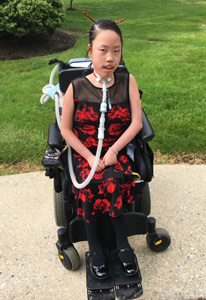About Tracy Chen

Interview conducted by Agnes Collison on October 29, 2020
Location: Philadelphia, Pennsylvania
Tracy Chen is an 18 year old woman with nemaline rod myopathy. She requires a ventilator to breathe and uses an electric wheelchair for mobility.
Tracy's Story: English
INTERVIEWER
Describe a typical day in your life before COVID-Describe your days now. Are there people you cannot see due to COVID? How are you coping with these temporary loss of connections?
TRACY
Due to my medical conditions, I have been living away from my family since I was six months old. Before the lock-down in March, I went to school on weekdays unless I had medical appointments. We also made a lot of social outings and I really miss those. On Sundays my family visited me: mom, dad and my two younger brothers. They haven't been able to visit since March, so that's been the hardest. I talk or text, sometimes Face Time with them on the phone, but it's just not the same. My parents only speak some English, and I do know a little bit of Chinese but not a whole lot because I have never lived with them. So, it's hard to feel connected.
INTERVIEWER
Describe the challenges you are experiencing due to COVID. How do these challenges impact your future plans?
TRACY
Not seeing my family [SINCE COVID-19] is definitely the hardest. My residence couldn't accept visitors after the lock-down, so I didn't see my parents and brothers for almost five months!
This is also a year of many milestones in my life. I graduated from Widener Memorial School as the valedictorian of my class, turned 18 in April and [I'm] finally moving home. Because of the lock-down, my family and Margaret, who has taken great care of me for the past 16 years, did a drive-by to shout out and wish me a happy birthday; that even got into the local news so I was a celebrity for a day! But it made me sad not being able to share the joy with my family in person.
Some days I feel so anxious and frustrated, and then get annoyed with myself for feeling that way.
I was scheduled to move home this summer and the transitional plans were put on hold due to COVID-19. It's been so hard on my parents too; they have been planning for the past several years. They saved up and built a new house with my accommodations, and both had been in training classes for over a year to learn to take care of me. I understand that now they feel even more overwhelmed by the risks of COVID since they run a small restaurant with a lot of foot traffic each day, but the delay seems endless. Some days I feel so anxious and frustrated, and then get annoyed with myself for feeling that way.
INTERVIEWER
What do you imagine your life will be like after COVID-19? What do you look forward to?
TRACY
It has been my biggest dream, as well as my family's, to finally live together under one roof. I hope that will happen in the near future. I hope I will be able to return to Widener Memorial School for another year to develop more skills to be productive and independent. Recently, I have been practicing getting off the ventilator for short periods, under my doctor's instructions. I started out at five minutes at a time and am up to thirty minutes now! I think what will change is that we will all be more grateful and thoughtful about how much it took for us to get to where we are.
I think what will change is that we will all be more grateful and thoughtful about how much it took for us to get to where we are.
Tracy's Story: 畅所欲言 (Mandarin)
INTERVIEWER
请描述在COVID-19 之前你典型的一天。描述你目前的一天。有那些変化?
TRACY
在疫情之前,除了去看医生,我每天去上学。我们也经常有些社交活动。毎个星期天,我的爸妈和两个弟弟会來探访我。他们從三月起就不能來了,所以这对我來说是最困难的。我和他们打电话,送讯息,有时候FaceTime, 可是總觉得不一样。我爸妈只说一点英语,而我只懂一点点中文,因为我從没在家里住过。所以在电话上沟通起来很困难,总是感觉不太亲密。
INTERVIEWER
因为COVID-19, 请描述你所经历的挑战。
TRACY
见不到我的家人绝对是最难过的。我的居所在疫情后不能允许探访,所以我将近五个月没有和爸妈和弟弟们见面!
今年对我来说是充满了生命里程碑的一年。我第一名從高中毕业,四月时滿了18岁,又準备终于要搬回家和家人一起生活。因为疫情的原因,我的家人和几位好友,包括從小照顾我的Margaret 开车從我的门前招手祝福我生曰快乐。附近的电视台还来采访,我竟然在一曰间成了名人!但是不能和我的家人在一起庆祝让我感觉很失望。
我原本打算今年暑假要搬回家,但是这计划因为疫情的原故延迟。我的爸妈的处境也很困难,他们为了这件事已经计划了好几年。他们辛苦的工作储钱,盖了一栋符合我的需要的新家;兩人在过去一年多中一起受训学习照顾我的全面护理医疗课程。我理解他们现在更担心疫情的风险,因为他们开一家小餐馆,来来往往的客人很多。但是这延迟像是了无尽期。许多时后我感觉非常的焦虑不安又沮丧,而又对自己感到懊恼。
INTERVIEWER
你预测你的人生在COVID-19 之后会怎样?你觉得那些方面会不同?
TRACY
因为我的健康状况,我從六个月大就不能和家人住在一起。我最大的梦想,也是我家人的梦想就是终于能全家人在同一个屋顶下一起生活。我希望在不久的未来这个梦想能够实现。我希望能继续上学一年,学习一些有用的技能使我能更加独立。近来,在我的医生的指示之下,我在练习取除呼吸机自己呼吸。從一次五分钟开始,现在己经可以维持到半小时!
我想会改变的是我们都会用感恩的心,时刻记得我们走过多长远的路程才达到现有的一切。
The Chinatown Disability Advocacy Project (CDAP)
The Chinatown Disability Advocacy Project is a grassroots group of parents and community members who educate and advocate for inclusion in education, healthcare, and social life. We hold monthly workshops, education sessions and community activities, so people have information to best plan for themselves and their families. You can follow the Chinatown Disability Advocacy Project on Facebook to find out about our activities.
华阜残障倡导会是一个由家长与社区成员共同组成的团体。我们的使命是运用教学和拥护的方式,提倡在教育,医疗保健,和社交生活的社会融入。我们每个月提供讲座,教育培训,和社区活动,以期提供资源,帮助大家和家人更好的计划未来。请您在臉書上跟随Chinatown Disability Advocacy Project 来参与我们的活动。
About the Project

This project was made possible with generous support from the Independence Public Media Foundation.
For more information
Contact us at [click-for-email].
The Disability and Change Symposium is available as a free online learning module.
Combating Implicit Bias: Employment

About this year's theme
Employment statistics for persons with disabilities continue to be disappointing, ~19% compared to ~66% of peers without disabilities. (US Bureau of Labor Statistics, 2018). We ask ourselves, "is there something beyond overt discrimination and access that perhaps we need to address? Are there silent barriers such as those created by implicit bias?"
Most of us believe that we are fair and equitable, and evaluate others based on objective facts. However, all of us, even the most egalitarian, have implicit biases – triggered automatically, in about a tenth of a second, without our conscious awareness or intention, and cause us to have attitudes about and preferences for people based on characteristics such as age, gender, race, ethnicity, sexual orientation, disability, and religion. These implicit biases often do not reflect or align with our conscious, declared beliefs.(American Bar Association, Commission on Disability Rights, "Implicit Bias Guide," 2019)
This year's theme challenges us to each ask ourselves "What implicit bias(es) do we have and encounter, and how do we recognize them and move beyond them to create opportunities, welcome, and full participation for all?"
As always, this Symposium privileges first-person voices and experiences.
About the Disability and Change Symposium
The stated goal of the annual Symposium is "to create conversation that transcends any one-dimensional depiction of people with disabilities, and foregrounds the multidimensional lives of our speakers - as writers, educators, performers, and advocates."
The Disability and Change Symposium is a one-day, interdisciplinary conference focusing on cultural equity and disability. The event is free, accessible and open to the public.
Acknowledgments
Organized by the Institute on Disabilities at Temple University, the Symposium is an outcome of collaboration with the Interdisciplinary Faculty Council on Disability whose mission is "to foster collaboration across Temple University on disability-related projects including research, teaching, programming, publication, and grant-seeking. By connecting with one another, Council members help build community among the growing number of people at Temple whose work engages with disability."
Core funding for the Disability and Change Symposium is through a grant from the Center for the Humanities at Temple University (CHAT)
We extend our appreciation to Disability Resources and Services for providing Communication Access Realtime Translation (CART) and American Sign Language services for the day.
The Institute on Disabilities, Temple University College of Education is pleased to recognize some of our 2020 Symposium Partners/Sponsors from Temple University:
- Center for Bioethics, Urban Health, and Policy (CBHUP), Lewis Katz School of Medicine
- Center for Humanities at Temple (CHAT), College of Liberal Arts
- Dean of Libraries
- Dean of Students
- Delta Alpha Pi International Honor Society
- Disability Resources and Services (DRS), Student Affairs
- Division of Student Affairs
- Faculty Senate Committee on Disability Concerns
- First Year Writing
- Intellectual Heritage
- Interdisciplinary Faculty Council on Disabilities
- Office of Institutional Diversity, Equity, Advocacy and Leadership (IDEAL)
- School of Sport, Tourism, and Hospitality Management
This year we also want to recognize the contributions of students (Associate Professor Deb Blair, STHM 2114 - Leisure & Tourism in a Diverse Society), who contributed to shaping and supporting this symposium:
- Madeline Culbert, School of Sport, Tourism, and Hospitality Management; Bachelor of Science: Tourism and Hospitality Management (est. 08/2021)
- Jair Guardia, School of Sport, Tourism, and Hospitality Management, Bachelor of Science: Tourism and Hospitality Management. (est. 08/2021)
- Hallie Ingrim, School of Sport, Tourism, and Hospitality Management Bachelor of Science: Tourism and Hospitality Management
- Thomas Leonard, School of Sport, Tourism, and Hospitality Management Bachelor of Science: Tourism and Hospitality Management (est. 08/2021)
- Bryan McCurdy, School of Sport, Tourism and Hospitality Management, Bachelor of Science: Tourism and Hospitality Management (est. 05/2022)
